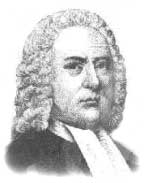Justification From Eternity on:
[Wikipedia]
[Google]
[Amazon]
 Justification from eternity is a concept within
Justification from eternity is a concept within
 Justification from eternity is a concept within
Justification from eternity is a concept within Protestant
Protestantism is a Christian denomination, branch of Christianity that follows the theological tenets of the Reformation, Protestant Reformation, a movement that began seeking to reform the Catholic Church from within in the 16th century agai ...
theology
Theology is the systematic study of the nature of the divine and, more broadly, of religious belief. It is taught as an academic discipline, typically in universities and seminaries. It occupies itself with the unique content of analyzing the ...
asserting that the justification of a believer takes place at least partially in eternity past.
Justification from eternity is not part of mainstream Protestant theology, and is explicitly rejected by the Westminster Confession of Faith
The Westminster Confession of Faith is a Reformed confession of faith. Drawn up by the 1646 Westminster Assembly as part of the Westminster Standards to be a confession of the Church of England, it became and remains the " subordinate standard" ...
, which asserts,
God did, from all eternity, decree to justify all the elect, and Christ did, in the fullness of time, die for their sins, and rise again for their justification: nevertheless, they are not justified, until the Holy Spirit does, in due time, actually apply Christ unto them.
Reformed orthodox
Reform is beneficial change
Reform may also refer to:
Media
* ''Reform'' (album), a 2011 album by Jane Zhang
*Reform (band), a Swedish jazz fusion group
* ''Reform'' (magazine), a Christian magazine
*''Reforme'' ("Reforms"), initial name of the ...
theologians taught that justification is part of an order of salvation, and that it follows effectual calling Effectual calling (or effective calling) in Calvinist Christian soteriology is a stage in the ''ordo salutis'' in which God calls a person to himself. It is connected with, but different from ''external calling'', in which a person hears the gospel ...
and a person actually believing. Francis Turretin
Francis Turretin (17 October 1623 – 28 September 1687; also known as François Turrettini) was a Genevan-Italian Reformed scholastic theologian.Antinomian
Antinomianism (Ancient Greek: ἀντί 'anti''"against" and νόμος 'nomos''"law") is any view which rejects laws or Legalism (theology), legalism and argues against moral, religious or social norms (Latin: mores), or is at least consid ...
Hyper-Calvinism," Early antinomians John Eaton John Eaton may refer to:
* John Eaton (divine) (born 1575), English divine
*John Eaton (pirate) (fl. 1683–1686), English buccaneer
*Sir John Craig Eaton (1876–1922), Canadian businessman
*John Craig Eaton II (born 1937), Canadian businessman an ...
and John Saltmarsh taught that justification precedes faith, though they did not specifically teach the doctrine of justification from eternity, and William Twisse
William Twisse (1578 near Newbury, England – 20 July 1646) was a prominent English clergyman and theologian. He was named Prolocutor of the Westminster Assembly in an Ordinance dated 12 June 1643, putting him at the head of the churchmen o ...
taught that at least in some sense justification precedes faith. Justification from eternity seems to have been taught by William Pemble, and it was one of the charges against Anne Hutchinson
Anne Hutchinson (née Marbury; July 1591 – August 1643) was a Puritan spiritual advisor, religious reformer, and an important participant in the Antinomian Controversy which shook the infant Massachusetts Bay Colony from 1636 to 1638. Her ...
. Tobias Crisp
Tobias Crisp D.D. (1600–1643) was an English clergyman and reputed antinomian. In the end he proved a divisive figure for English Calvinists, with a serious controversy arising from the republication of his works in the 1690s.
Life
In 1600, Tob ...
was one of the most notorious teachers of this view. It was later propounded by John Gill John Gill may refer to:
Sports
*John Gill (cricketer) (1854–1888), New Zealand cricketer
*John Gill (coach) (1898–1997), American football coach
*John Gill (footballer, born 1903), English professional footballer
*John Gill (American football) ...
. Referring to Ephesians
The Epistle to the Ephesians is the tenth book of the New Testament. Its authorship has traditionally been attributed to Paul the Apostle but starting in 1792, this has been challenged as Deutero-Pauline, that is, pseudepigrapha written in Pau ...
1:3-4, Gill argued that "justification is one of those spiritual blessings wherewith the elect are blessed in Christ according to election-grace, before the foundation of the world."
Another exponent of this doctrine was Abraham Kuyper
Abraham Kuyper (; ; 29 October 1837 – 8 November 1920) was the Prime Minister of the Netherlands between 1901 and 1905, an influential neo-Calvinist theologian and a journalist. He established the Reformed Churches in the Netherlands, which upo ...
. G. C. Berkouwer
Gerrit Cornelis Berkouwer (1903–1996) was for years the leading theologian of the Reformed Churches in the Netherlands (GKN). He occupied the chair in systematic theology of the Faculty of Theology, Free University (VU) in Amsterdam.
Berkouwer ...
notes Kuyper's view came out of a belief that "justification does not originate through faith but that it is only ''accepted'' in and through faith."
Opponents of the doctrine have countered with the argument that it undermines justification by faith
''Justificatio sola fide'' (or simply ''sola fide''), meaning justification by faith alone, is a soteriological doctrine in Christian theology commonly held to distinguish the Lutheran and Reformed traditions of Protestantism, among others, f ...
.Louis Berkhof
Louis Berkhof (October 13, 1873 – May 18, 1957) was a Dutch-American Reformed theologian whose works on systematic theology have been influential in seminaries and Bible colleges in the United States, Canada, Korea and with individual Christians ...
, ''Systematic Theology'' (London, Banner of Truth, 1941), 519.
References
{{reflist Christian terminology Salvation in Protestantism Protestantism-related controversies